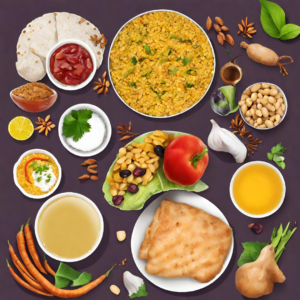Navratri Diet Plan that Can Help You Shed Pounds While Fasting
Navratri Diet Plan for Weight Loss
Navratri is a Hindu festival celebrated for nine nights, and during this time, many people observe fasting as a way to purify their bodies and minds. Fasting can be a great opportunity to detoxify and lose weight, but it’s important to have a well-planned diet to ensure you’re getting all the necessary nutrients.
Here’s a Navratri diet plan for 9 days that can help you achieve your weight loss goals:
Include these ten simple weight-loss suggestions in your Navratri diet plan.
1. Start with a healthy breakfast
Break your fast with a nutritious meal that includes fruits, nuts, and seeds. You can have a bowl of mixed fruits or a smoothie made with yogurt and berries. You’ll get vital vitamins, minerals, and antioxidants from this.
2. Choose Wholesome Fasting Foods:
- Opt for whole grains like buckwheat (kuttu) and water chestnut flour (singhara atta) instead of refined flours.
- Include fruits like bananas, apples, and papayas in your diet for natural sugars and fiber.
- Use low-fat dairy or dairy alternatives like yogurt and paneer.
3. Incorporate protein-rich foods into your diet.
Protein is essential for muscle repair and growth. Include protein-rich foods like cottage cheese, yogurt, lentils, and legumes in your meals. These foods will keep you full for longer and help you avoid unnecessary snacking.
4. Choose complex carbohydrates
Make smart choices by avoiding refined carbohydrates like white rice and instead, choose complex carbohydrates such as brown rice, quinoa, and millet. These complex carbs are fiber-rich, promoting good digestion and long-lasting satisfaction. When planning your meals, prioritize complex carbohydrates like whole grains, legumes, and vegetables for sustained energy and fullness throughout the day.
5. Include a generous portion of vegetables in your meals
Include a variety of vegetables in your meals to ensure you’re getting all the necessary vitamins and minerals. Vegetables like spinach, broccoli, and kale are low in calories and high in nutrients.
6. Navratri diet plan for weight loss: Ensure you stay well-hydrated
To stay hydrated and eliminate toxins from your body, sip lots of water during the day. You can also include coconut water, herbal teas, and buttermilk in your diet.
It’s critical to be properly hydrated for your general health and well-being. Here’s why it’s crucial:
- Regulates Body Functions: Water is essential for numerous bodily functions, including digestion, circulation, and temperature regulation.
- Aids Weight Loss: Drinking enough water can help control appetite and prevent overeating, supporting your weight loss goals.
- Enhances Physical Performance: Staying hydrated is vital for optimal physical performance, whether you’re exercising or simply going about your daily activities.
- Improves Cognitive Function: Dehydration can lead to difficulty concentrating and decreased mental alertness. Adequate hydration helps maintain cognitive function.
- Prevents Health Issues: Chronic dehydration can lead to various health problems, including kidney stones, urinary tract infections, and constipation.
- Detoxifies the Body: Water helps flush toxins from your system, promoting healthy organ function and skin.
During Navratri or any time, ensure you drink enough water throughout the day. If you’re fasting, focus on hydrating with water, herbal teas, and other non-sugary, low-calorie beverages. Maintaining proper hydration is a simple yet vital step in supporting your health and wellness.
7. Steer clear of fried and sugary foods.
Avoid fried foods like pakoras and Limit your consumption of sugar-laden sweets and desserts. These foods are high in calories and can hinder your weight loss goals. And opt for healthier options like dates and figs.
Fried and sugary foods, while often tempting, can pose significant challenges to your health and weight management. This is why it’s critical to stay away from them:
- High in Calories: Fried foods are typically laden with calories due to the oil used in frying. Similarly, sugary foods can be calorie-dense, leading to excess calorie consumption.
- Low Nutritional Value: These foods often lack essential nutrients like vitamins, minerals, and fiber. If eaten, they can cause nutrition problems.
- Blood Sugar Spikes: Sugary foods can cause rapid spikes in blood sugar levels, which are followed by crashes, leaving you feeling tired and hungry shortly after consumption.
- Increased Cravings: The combination of sugar and unhealthy fats in fried and sugary foods can trigger cravings for more of these items, making it challenging to maintain a balanced diet.
- Weight Gain: Frequent consumption of fried and sugary foods is a common contributor to weight gain and obesity.
- Impact on Health: These foods can increase the risk of chronic health conditions like diabetes, heart disease, and high blood pressure.
To support your weight loss and overall health, it’s advisable to stay away from fried and sugary foods as much as possible. Instead, opt for whole, unprocessed foods rich in nutrients and fiber to help you feel satisfied and energized
8. Practice portion control
While observing fasting, it remains crucial to maintain portion control. Opt for small, frequent meals to keep your metabolism active and avoid overeating.
Practicing portion control is a fundamental component of sustaining a healthy and well-balanced diet. It entails staying aware of the amount of food you consume during your meals. Here are some tips to assist you in mastering portion control:
- Use Smaller Plates: Serving your meals on smaller plates can create the illusion of a full plate, even with smaller portions.
- Listen to Your Body: Take Note of Your Body: Observe the signals your body sends when it is hungry or full. Eat without feeling too full—just until you’re satisfied.
- Divide Your Plate: Allocate a portion of your plate for vegetables, another for lean protein, and the rest for whole grains. This method encourages a balanced meal.
- Avoid Seconds: Resist the urge to go for seconds. Wait a while after eating to see if you’re still hungry.
- Pre-Portion Snacks: When eating a snack, divide it up into small portions before you begin, as compared to eating everything right out of the package.
- Be Mindful: Eat slowly, savor each bite, and engage in conversation during meals. You can feel fuller after eating less thanks to this.
- Use Your Hand: Your hand can be a handy guide for portion control. For instance, a serving of protein should be about the size of your palm, and a serving of grains should be about the size of your fist.
- Learn About Serving Sizes: Familiarize yourself with recommended serving sizes for different foods, as these can vary significantly.
Remember, portion control can help you manage your calorie intake, which is a crucial aspect of weight management and overall health. By practicing portion control, you can enjoy your favorite foods while still working towards your fast weight loss diet plan lose 5kg in 5 days or maintenance goals
9. Stay active
Include light exercises like walking, yoga, or dancing in your daily routine. Staying active will help you burn calories and boost your metabolism.
10. Mindful Eating
Eat slowly and mindfully. Enjoy each bite and stop when you’re satisfied.
Remember, it’s important to listen to your body and consult a healthcare professional before making any drastic changes to your diet. The Navratri diet plan can be a great way to kickstart your weight loss journey, but it’s essential to make sustainable changes for long-term success.
Tips: Navratri diet plan for 9 days of weight loss
- Avoid fried foods like aloo chips and kuttu puri.
- Use healthier ways to cook such as steaming, boiling, and sautéing.
- Increase your water consumption to help your body clean itself of toxins and stay hydrated.
- Replace sugary snacks and fizzy drinks with low-fat milk smoothies, fruits, and fruit juices.
- Don’t forget to eat during your fast.
- During your fasting time, it is advised that you take early walks in the park.



Good Work Rathore Ji